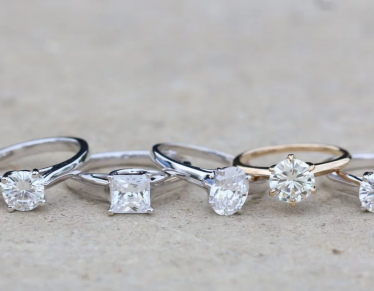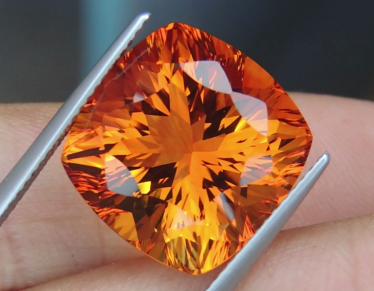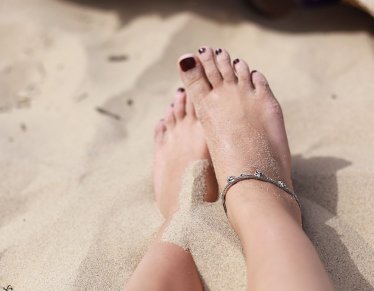Popping the question to the One? If you’ve finally mustered the courage, you know you will need the perfect ring to go along with your dreamy proposal. Picking an engagement ring is often almost as stressful as the act of proposing. How do you choose? Will she like it? Will she say yes to the ring? What if she hates it? Before your brain goes haywire on these terrifying barrage of questions, pause and take a deep breath. This ring is about to be a symbol of your love for each other, ushering the two of you towards a lifetime of togetherness. Choosing the ring need not be a frightening experience; as the most memorable prelude to your life together, it should also be the sweetest.
If you are on the brink of proposing and spending many a sleepless night, stressing over it, remember, you’re not the first. Since the beginning of time, asking a woman’s hand for marriage has never been a piece of cake for anyone. Every person wants to carve an experience unlike anything anyone has done before – the one you decide to spend your life with deserves nothing less than magic. Engagement rings have always been at the center of this quest to create absolute magic. It could be a stunning rock of diamonds that dazzles everyone who looks at it or a ring weaved from the twig of a tree, maybe not the most durable but it certainly touches the heart- no proposal is ever truly complete unless you’ve put a ring on it.
When we say the average engagement ring size is not a new one and Hollywood romcoms are not to blame for the soaring sales of jewelry stores, we mean it. Proposing with an engagement ring can be, in fact, traced back to as far as time goes.
Going Back in Time with Engagement Rings
Think the tapestry of engagement rings began in the early 1900s with Humphrey Bogart and Elizabeth Taylor? Maybe in the 1700s and 1800s, speared by the European nobility? Perhaps the Egyptian pharaohs can be credited with introducing the most romantic gesture of all time. Well, you are in for a shocker. Although not the engagement ring as we know it to be today, the seed of the thought goes back to the prehistoric era- when men were hunters while the women made a home of their caves. To claim a mate as his own, the man would tie braided grass around a woman’s wrists, ankles, and waist. Not only did it signify a bond for life, but it was also thought to bring the woman’s crackling spirit under his control. Does not sound too romantic, does it? Engagement rings certainly have come a long way since then.
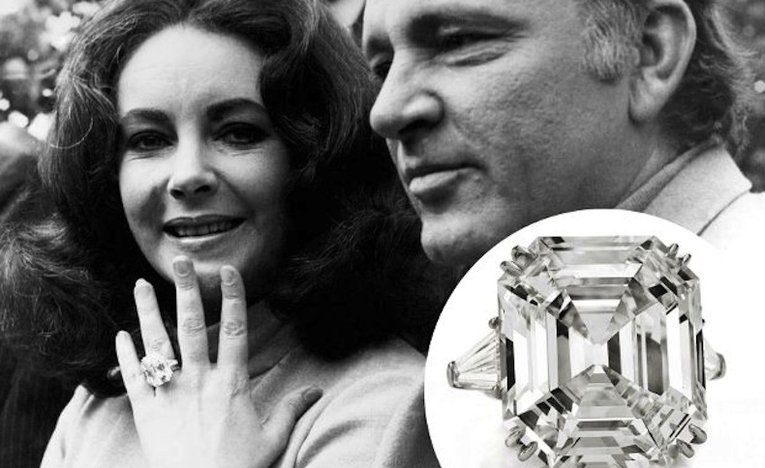
It wasn’t until Egyptian empires began rising when engagement rings gained a truly romantic connotation. They considered circles or as they called it, Ankh, to be a symbol of eternal life and when choosing their queen, they made a point of wanting to spend an eternity together. Even then, despite the love of Egyptian pharaohs for ornamental jewelry, the rings worn by married couples were just a simple band of gold and silver. Worn on the ring finger of the left hand, they believed the vein on this finger, vena amoris, which literally stands for “vein of love” led straight to the heart. Although engagement rings are a much more elaborate affair in this day and age, they are still worn on this very same finger by most- maybe it does not lead to the heart but when it comes to matters of the heart, it is the thought that counts.
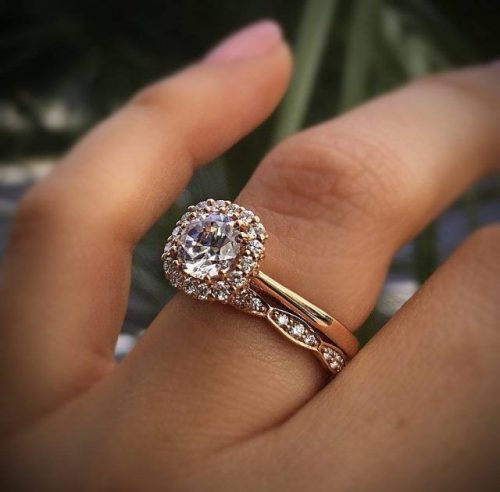
Now that we know how rings have always been a romantic gesture, we still haven’t discussed diamond rings. A diamond ring is the epitome of an engagement ring. If you aren’t getting your partner diamonds, the world of expectations around the celebrated event is going to come down crashing over you. Since when did diamonds become such an integral part of engagements? Turns out it wasn’t till centuries later.
For the cultural representation of love that diamonds have now become, we have one romantic duke to thank. In 1477, Archduke Maximillian proposed to Mary of Burgundy with a beautiful gold ring, embellished with little diamonds spelling out the letter M. With a heartfelt gesture setting new precedents for European nobility, instantly, it was a match made in heaven.
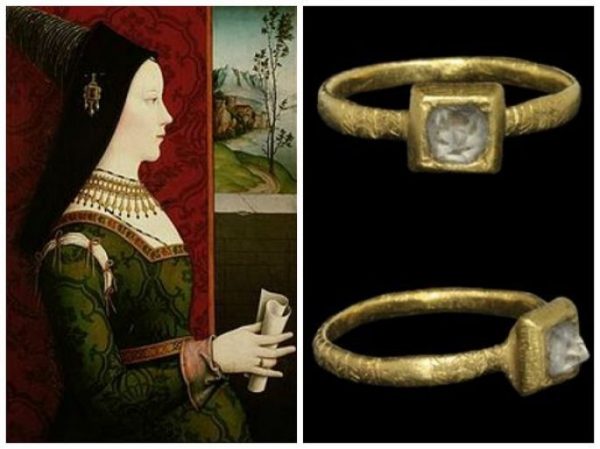
By the 17th century, diamonds were a full blown revolution. With the discovery of diamond mines in South Africa, engagement rings were never the same again. And this time, we have the capitalistic corporates to thank for it. The De Beer Mining Company, found right after the discovery of the treasure trove of diamonds in Africa, wasted no time in leading charge. Within a decade of its establishment in 1880. De Beer reigned over 90% of the global diamond production with the fiercest monopoly if there is one.
If there’s one thing the world now knows as it is engulfed in consumerism, it is that product and volume dim unless they are backed by a strong marketing engine. Even at the dawn of the 18th century, De Beers needed no telling. Partnering with an ad agency, N.W. Ayer & Sons, they launched a marketing campaign that has defined diamonds as we know it to be today. With the tagline, “A diamond is forever” and advertisements which shrewdly placed diamonds as a measurement of true love, De Beer gave shape to the essence of diamonds, emblazoning them into public perception and the romantic saga they created in our minds is still going strong, even a century later.
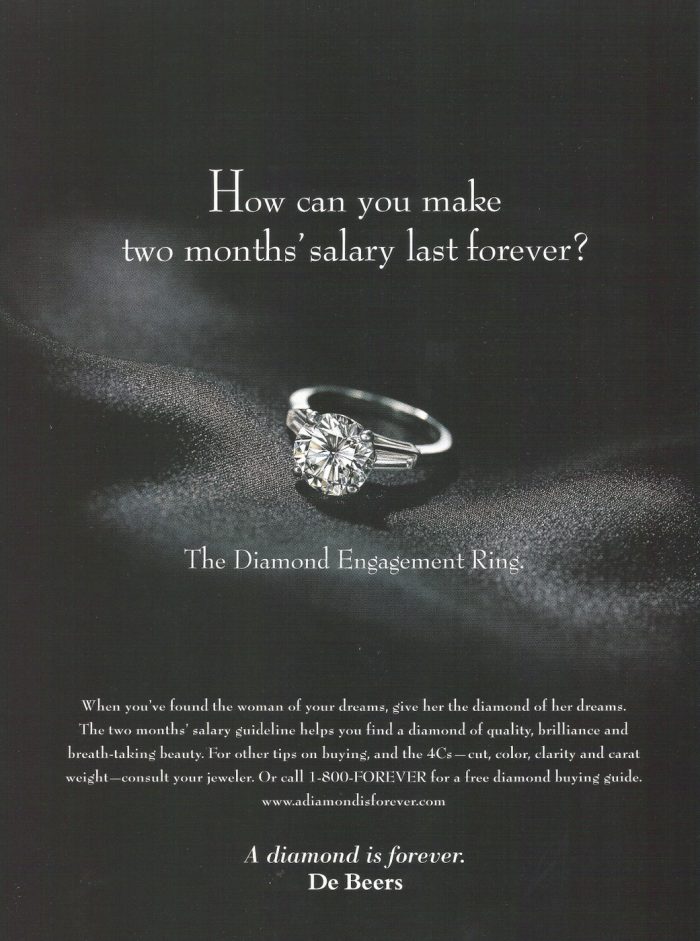
After the end of the Great Depression, De Beer convinced men to spend 2 months of their salaries to purchase a diamond ring for the girl of their dreams, prompting urgency in the men and shaping expectations in everyone. The idea of diamonds representing an eternity of love and not presenting your lover with these gems foreshadowing no love lost between the couple is a familiar picture that the world can still relate to and will perhaps do so till the end of time.
Engagement Rings Today: The Average Carat Size
When shopping for engagement rings, you are bound to feel like a fish out of water. Who knew jewelry had its own lingo? With hoity-toity jewelers throwing around terminology like carats, inclusion, and melee, it is hard not to lose your mind then and there. Thankfully, we are here to guide you through everything you need to know before purchasing the perfect engagement ring. We also suggest you do as much digging up as possible and walk into the store with as much information as any professional gemologist; it may sound ridiculous but when it comes to engagements, weddings, and the whole affair, anything less than perfect is going to haunt you. Besides, when you finally pop the question to your lady love, she should have an inkling of just how much thought went into it.
When it comes to the gemstones for your ring, there are a few features you absolutely need to check upon. We call them the 4Cs – Carat, Clarity, Color, and Cut. As you go over all the options that lay before you, these 4Cs are going to be the deal-breaker which will help you make your choice.
The first thing to know is the carat size of the ring. When your newly engaged fiancé will be showing off her ring to friends and family, everybody will want to know how many carats the ring is. So, what is this carat, pronounced carrot, which we speak of and just how many should you go for?
A carat is a standard unit for the weight of gems and precious stones. A popular misconception is that it’s a unit for size. But let us inform you that even the biggest ring you’ve ever seen could probably fall short when talked about in carats. Measuring gems and diamonds in carats is much more convenient as it allows more precision since carats can be subdivided into 100 points. If you hear a jeweler referring to a diamond ring as a 50 pointer, what he or she means is that the weight of the diamonds in the ring is about 0.5 carats. Each carat is approximately 200 milligrams. The price of the ring you buy is mostly determined by its carat weight. Naturally, jewelry with a higher weightage of natural stones is going to be pricier. However, when setting the price for a ring, other factors such as clarity, color, cut and setting also come into play.
Now that you know what a carat means, the next question which follows is- how many carats should you look for in an engagement ring?
The largest clear cut diamond known to man is about 530 carats (106.08 grams). Known as the Star of Africa I, it is mounted atop the Sovereign’s Sceptre with Cross, one of the Crown Jewels of England. Although it is impossible to put a price on it- since discovered in 1905 from the depths of Africa, there has been nothing quite like it- the Star of Africa I is valued to be about $400 million today.
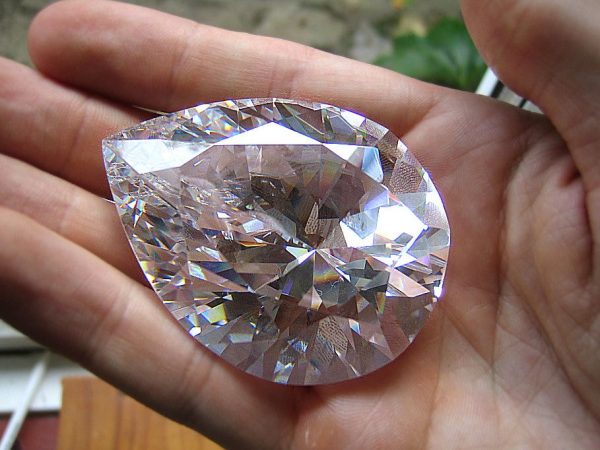
If that number took your breath away, you’re not the only one. But relax. You are not expected to get hold of one of the Crown Jewels for your engagement. When it comes to jewelry that is worn more often than royal regalia, there is much more to consider than the mere weight. The brilliance, shape, and design are just some important details which should not be missed.
Besides, as any couple will tell you, it is the sentiment that counts. And while we are going on about choosing the right carat weight, keep an eye on your budget. As you’re planning a wedding, you’re already likely to be strained. Remember, you are looking for an engagement ring that perfectly captures your love for each other; the most expensive ring in the shop or the ring with the biggest carat weight may not necessarily be the one.
Putting a finger on the average carat weight is not quite so easy. It can vary across regions, socioeconomic class and personal preferences. But finally after tonnes of research, here are some ballpark figures for what could be considered the average carat weight.
The average carat weight seems to be the highest in the US at 1.0 carats. This could be because of the emphasis American society places on diamond engagement rings- the bigger, the better. The cost could be anywhere around 6,000 USD.
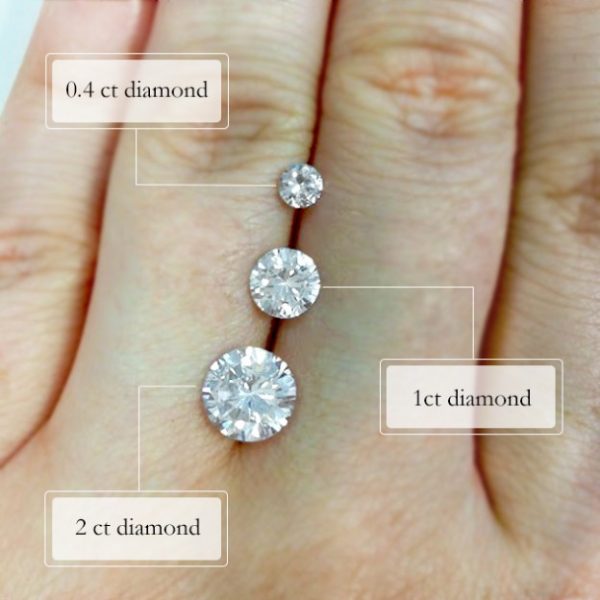
The UK, on the other hand, leans towards a slightly smaller carat weight, with an average of 0.6 carats. A diamond engagement ring of 0.6 carats significantly cuts costs with an average cost of 2,000 USD. In the rest of Europe and Eastern Asian countries such as China, Singapore, and Malaysia, the average carat weight is even lower at 0.5 carats.
The reason behind these statistics may be because proposing with a diamond ring has not yet become a mandate as in the US and UK. But as global influence increases and general wealth across the region continues to grow, diamond rings are soon going to be the norm and Eastern Asia will dominate the diamond market. Take Hong Kong, for instance. With its history as a British territory, Hong Kong has been most influenced by the Western lifestyle. And then, it went on to become the wealthiest city in the region with its booming industries and towering skyscrapers. With its great affluence and pervasive Westernization, it should come as no surprise to anyone that the average carat weight in Hong Kong is about 0.7 carats, the highest in the Asian continent.
Although we’ve covered how average carat weight can vary from country to country, the difference can be even more minute. After all, socioeconomic class, income, prevailing trends, and style can differ vastly within the same country. For example, in the urban mega-hub that is New York City, the average carat weight can peak higher than 1.0 carats. On the other side of the US, the smaller and quieter Nebraska City could have an average carat weight lower than 1.0 carats. The point to be noted here is that besides the size of your pocket, where you live could largely determine ring preferences.
In big and bustling metropolitans, it is difficult to do away with less than a giant sparkling rock. After all, the engagement ring will be shown off to friends and family and unless their jaws drop to the floor at the sight of the ring, many people would not consider the proposal to be a success. But in quaint little towns, where emotions still reign supreme, even tiny diamond engagement rings, brought with a lot of love and care, can melt the hearts of onlookers.
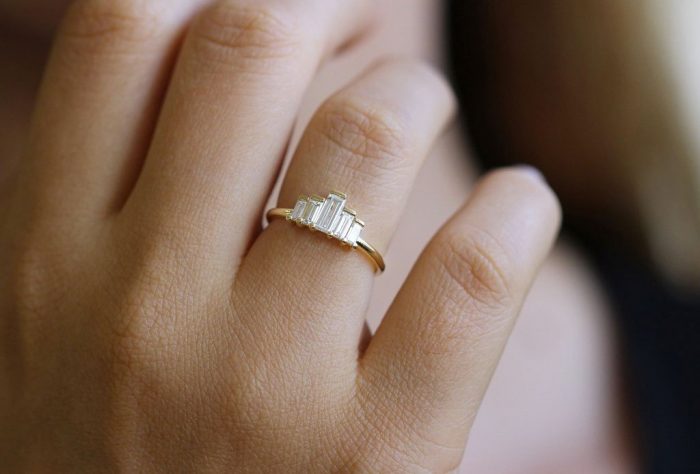
If you now have a fairly good idea of the carat weight you want for your engagement ring, there is still a nagging worry about your budget. A wedding can cost a fortune in this economy and even though you want to create a perfect fairytale wedding, not all of us can afford to spend obscene amounts without a care in the world. Here’s a golden tip from wedding jewelers to cut down the cost of your wedding and engagement ring. When choosing the carat weight, avoid magic numbers. If you don’t know what we are talking about, look at the whopping price tag every 0.5 carats.
On the other hand, going slightly below 0.5, 1.0, 1.5 carats, etc. can cost 25% less than these magic numbers with an imperceptible difference. For example, if you believe a 1.0-carat engagement ring is the perfect one for you, go for a 0.8 or 0.9 carats ring. In this way, you will be able to spend more on the cut and setting of the stone, allowing you to show off its brilliance to the fullest.
Color
Color is just what you are thinking it is – the color of the body of the stone. To the untrained eye, this is the most important feature as it is the easiest to spot and most people are quite vehement about their color preferences. If a naturally vivid colored engagement ring is what you are looking for, there are plenty of stones to choose from.

For a fiery red, you can have a ruby engagement ring or for an electric blue, sapphire is already quite popular as an engagement ring. But if your heart is set on a diamond, the classic gem for jewelry which celebrates love, your color options will be a little more limited.
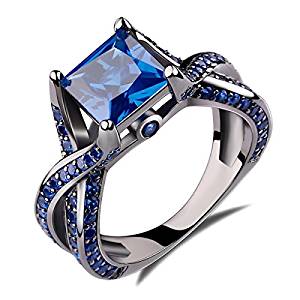
Despite the minuscule variations in color of diamonds, gemologists have done a fine job of grading it. After all, it is the most precious stone if there was ever any. The Gemological Institute of America (GIA) introduced a color grading system for diamonds on a scale of D-F and this is universally used today to grade diamonds.

When it comes to diamonds, colorless is the most valued color grade of them all. Even when the difference can’t be picked up by the untrained eye, the price of a diamond ring skyrockets when it’s a purely colorless stone. D grade, perfectly colorless is considered to be of the highest quality among diamonds. It belongs to the colorless category with E and F; all three grades are quite comparable and similarly colorless.
Being rare in nature, they are the most expensive ones too. G-J falls in the near-colorless category. They often have a very faint yellow hue to them but it is nearly impossible to detect. G grade is particularly difficult to discern from higher grade diamonds. K-Z category often has a deep shade to them which is easily detectable under the naked eye. They are also the cheapest and are usually not in demand as engagement or wedding rings.
Although colorless diamonds are traditionally prized, modern couples are also interested in colored diamond rings which reflect the vibrancy of their relationship and personalities. Most diamonds already have a natural yellow hue. This is most visible in Z grade diamonds where the color is most saturated. You may also find hues of blue, brown and red. They appear quite light in nature. Deeper tones are often artificially processed and are more affordable than the colorless varieties of diamonds.
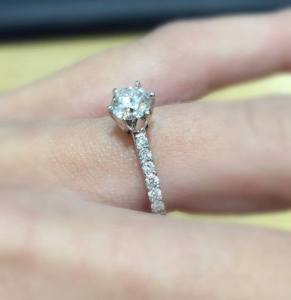
If you are looking for a classic diamond engagement ring on a budget, the near colorless category is your best friend. You get the highest bang for your buck, especially if you are purchasing a G grade diamond. Difference between a G grade and a higher grade can hardly be detected with the naked eye and this is why 18% of customers choose G grade diamond engagement rings. Slightly lower grades such as I and J have a very faint yellow tinge to them but you can avoid them altogether with H and G grade, without spending a fortune. But if you do have the fortune to spend and prefer your diamonds to be the purest, you are free to check out the colorless category (D-F).
Clarity
Clarity refers to the purity of the diamond. It is based on the number and location of imperfections inside the diamond. Naturally, the fewer the imperfections, the higher is the price. A perfectly flawless diamond is very rare and is bound to be exorbitantly priced.
Even the imperfections on a diamond can vary. For instance, imperfections on the surface are referred to blemishes while internal imperfections are called inclusions. If you are wondering what these look like, inclusions can be little clouds or feathering inside the stone while blemishes are the scratches, chips or nicks right on the surface layer. Although we will be briefly delving into what clarity constitutes of for diamonds and the corresponding grading system, you could do well to remember that almost all diamonds have some amount of imperfections in them and when it comes to purchasing a diamond engagement ring, clarity is not as important a factor as the rest.
The GIA classifies diamonds according to clarity based on a scale consisting of 6 categories and 11 grades. To start with the crème de la crème of diamonds, those belong to the FL or flawless category. These two often have some sort of inclusion but aren’t visible even under 10x magnification. FL diamonds are extremely rare and expensive. Then we have the IF or internally flawless category. While the inclusions can’t be seen with the naked eye, there are some visible surface blemishes on these.
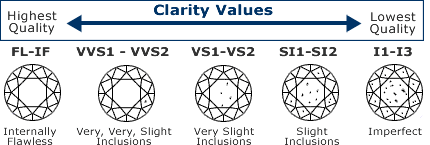
The next category is VVS or very very slightly included. This category has two grades – VVS1 and VVS2. VVS diamonds may have little inclusions but it is quite difficult for even professionals to detect them without magnification. Then, there is VS or very slightly included diamonds. The internal defects are just as difficult to detect as in VVS diamonds but diamonds belonging to this grade are much less expensive since they have just a few more inclusions. Slightly Included or SI category diamonds have inclusions which, although difficult to detect, can be seen if viewed from specific angles such as the top or from the lower portion. The SI category has two grades of diamonds- SI1 and SI2.
The third is I1 or included diamonds. These have very minor inclusions which can be seen by the naked eye. Finally, the last category in the scale is called heavily included diamonds and it consists of two grade- I1 and I2. The inclusions on I2 and I3 diamonds can be easily spotted.
FL and IF grade diamonds are extremely rare. You may still purchase them but if you are on a budget, remember that most people can’t tell the difference and clarity is just a grading guide for jewelers and gemologists. If you are looking to get the most value for money without giving up on clarity, your best options are VS and SI category diamonds. The imperfections on these are barely visible to the untrained eye. In fact, 43% of customers purchase VS grade diamond rings. But if you are on a tighter budget, don’t worry. You can still purchase I1 diamonds and with just a little bit of expert cutting, carve it into a ring as good as any of the higher grades.
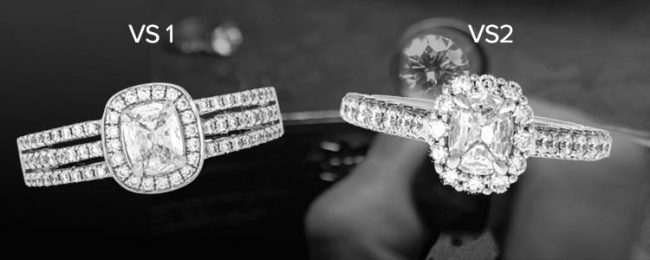
One of the reasons why you can put clarity at the back of your mind while getting diamond rings is that you can often replicate the look of a flawless diamond by just cutting and setting the diamond cleverly. For instance, round, oval, princess, marquise, pear and heart shaped diamonds do a brilliant job of concealing inclusions. If you are looking to purchase a lower grade diamond, you can easily make it look just like the real thing by choosing the right cut.
On the flipside, emerald and Asscher cut or step cut diamonds let you look into the depths of the stone, making any flaw even more visible. If those are the cuts you prefer, you should prioritize higher grade diamonds. Besides, if you want to keep clarity at a high, you could try having a look at smaller sized diamonds. The smaller the diamond is, the harder it is to spot any defects.
Cut
Finally, we’ve reached the single most important factor which will often determine whether a ring is a hit or a miss. Most people decide whether they love or hate a ring based just on the cut of the stone. Your choice of cut gives away your personality and just the kind of person you are. Besides, when you want to flaunt your ring to the fullest, remember that the cut is the ultimate deciding factor of how flashy your ring looks. Especially when it comes to diamonds, the right kind of cut will show off the ring’s brilliance, reflecting and refracting light through its facets, creating a sparkling symphony.
When we are addressing the cut of a diamond, it can refer to two things – the cut quality and cut shape. Cut quality is about how the stone has been carved and how well it reflects light. It is a bit more technical than just that and you will need your jeweler’s help to navigate the cut quality of a particular stone. In general, cut quality is assessed by the symmetry, facets, depth, and brilliance of the diamond. The better the cut, the more your ring will sparkle.
For a newbie, assessing the cut quality is no easy task. So to make things easier for you, let your jeweler know that you are looking for a diamond with an “excellent” or “very good” cut and will not be taking anything lower. Cut shape, on the other hand, is exactly what it sounds like – the shape of the diamond. Different cut shapes play up the levels of the brilliance of the stone and also appeal to different personal styles.
If there’s one cut which has epitomized the look of diamond rings over the years, it is the round brilliant. It has been a timeless favorite, transcending entire eras. With 58 facets, the round brilliant cut allows the maximum reflection of light, creating a truly brilliant piece. 3/4th of all engagement and wedding rings sold are of this cut. It is also a bit more expensive than any of the other cuts.
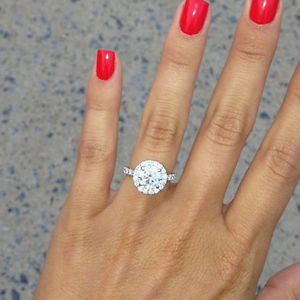
Then there’s the princess cut diamond ring for ladies who deserve to feel like royalty. The princess cut features a square shape, a modern twist on the traditional round brilliant. Despite being a relatively new cut shape, this one has a classical element to it that is hard to miss.
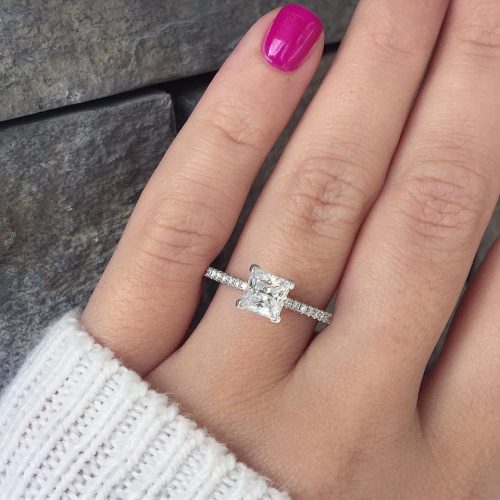
There are a number of other cut shapes that are becoming increasingly popular as wedding or engagement rings. The understated emerald cut such as the one worn by Beyoncé or the romantic cushion cut ring like Kim Kardashian’s, the edgy marquise cut or the historic Asscher – there are plenty of shapes for you to have a look at and choose your favorite from among them.
Our Favorite Engagement Rings!
If you have made it this far, you are now well equipped with everything you need to know about engagement rings. To give you nudge in the right direction and get you started on ring shopping, here are a few rings you can have a look at. You might just find the perfect engagement ring for the love of your life.
Houston Diamond District 3/4 Carat GIA Certified 14K White Gold Solitaire Round Cut
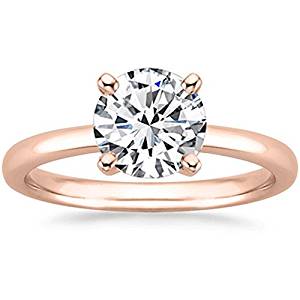
Propose to the love of your life with a simplicity that touches the soul. With one look at this dazzling ring that says it all, the message from your heart will be sealed, signed and delivered.
This ring combines traditional engagement styles with modern minimalism. The diamond has a weight of 0.75 carats with an S1-S2 clarity. The G-H color grade means it is almost colorless. Any faint hue will be impossible to detect with a naked eye. The round brilliant shape, paired with a very good cut quality, brings out the brilliance and fire of the diamond to its fullest. The diamond is set on 4 prongs, a classical setting style. The band, made from 14k gold, is available in platinum, white gold, rose gold and yellow gold colors. The simplicity of the band perfectly complements the dazzling brilliance of the diamond.
Amazon Collection 14k White Gold Aquamarine and Diamond Ring
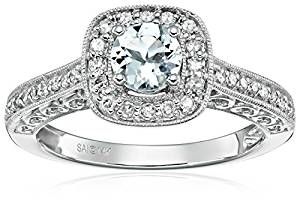
Now this is an ornate piece of jewelry, a dazzling work of diamonds and gold. If you have a lavish proposal in mind but do not have the biggest of budgets, maybe have a look at this one, selected by Amazon Collection itself.
The center features round-cut aquamarine stone, the lightest of blues with a romantic softness. The center stone is surrounded by a halo of little diamonds, creating a sparkling aura. The halo setting with a centerpiece is also a very popular choice of setting in 2018. Even the band, made from 14k white gold, has numerous little diamonds set on it beautifully. Besides, the gallery and band are decked in a swirling filigree design for elaborate artistry.
The diamonds are of 0.25 carats, round cut shape with fair cut quality. The color and clarity of the diamonds are quite reasonable with G grade and I2-I3 clarity.
Houston Diamond District 1.35 Carat Princess Cut
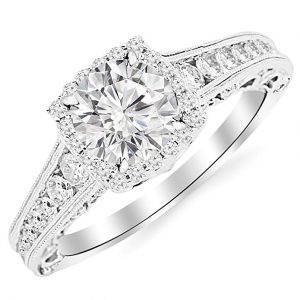
Not everybody can afford a royal proposal. But if you have the money for it, nothing should hold you back from making the love of your life feel like a princess. For an engagement that has been in the works for a while, check out this ring. Made by Houston Diamond District, it is a heart-stopping a piece of the finest quality.
The diamond on this one is a whopping 1.35 carats, carved into a classic princess cut and set on 4 prongs. This large and sparkling stone is of the perfectly colorless category (D-F) with a clarity grading of VS1. This means it has very little inclusions in it which can hardly be seen without magnification. Besides, being perfectly colorless, it is a rare prize. The band is made from 14k white gold and it is also channeled with little diamonds, adding an ethereal glow to the centerpiece.
This ring by Houston Diamond District is far from an ordinary ring. With its old Hollywood charm, it will take away the breath of anyone who so much as glances at it.
Ready to Go Ring Shopping?
With all the talk about millennials shunning marriage, the art of a traditional proposal- going down on one knee, flowers, a diamond ring, and a serenading orchestra- is becoming much more valuable than ever before. Proclaiming your love before the world and celebrating your togetherness may not be as common as before but that makes it all the more special.
Ever since we were children, many of us have envisioned how we want our proposal to be and nobody knows it better than the girls. Perhaps you’ve dreamt of a large round brilliant diamond ring or a maybe even a bohemian opal. Now, years later, matching up to the standards of your childhood dream may seem like an intimidating prospect. But as those hopelessly in love will tell you, we now know that it’s what in the heart that counts. An engagement ring, picked with love and emotions, is a worthy match for even the most extravagant diamonds.
If you’ve found the one you’re ready to spend the rest of your life with, it’s time you take the leap. Choose an engagement ring that captures the essence of your relationship and let your fairytale unfold.

